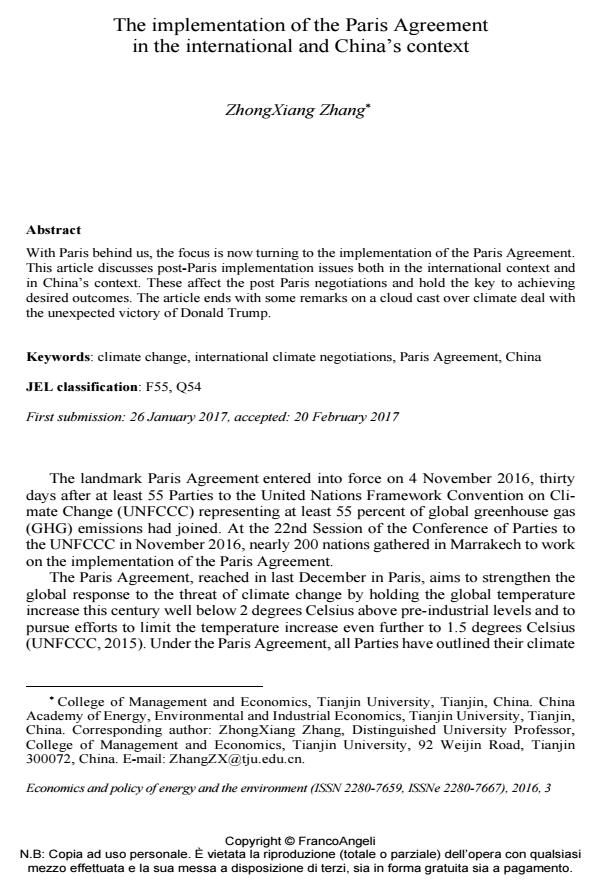The implementation of the Paris Agreement in the international and China’s context
Journal title ECONOMICS AND POLICY OF ENERGY AND THE ENVIRONMENT
Author/s ZhongXiang Zhang
Publishing Year 2017 Issue 2016/3 Language English
Pages 7 P. 63-69 File size 133 KB
DOI 10.3280/EFE2016-003005
DOI is like a bar code for intellectual property: to have more infomation
click here
Below, you can see the article first page
If you want to buy this article in PDF format, you can do it, following the instructions to buy download credits

FrancoAngeli is member of Publishers International Linking Association, Inc (PILA), a not-for-profit association which run the CrossRef service enabling links to and from online scholarly content.
With Paris behind us, the focus is now turning to the implementation of the Paris Agreement. This article discusses post-Paris implementation issues both in the international context and in China’s context. These affect the post Paris negotiations and hold the key to achieving desired outcomes. The article ends with some remarks on a cloud cast over climate deal with the unexpected victory of Donald Trump.
Keywords: Climate change, international climate negotiations, Paris Agreement, China
Jel codes: F55, Q54
- Carraro C. (2015). On the recent US-China agreement on climate change. 19 January, -- http://www.carlocarraro.org/en/topics/climate-policy/on-the-recent-us-china-agreement-on-climate-change.
- Clark P. (2015). COP21: China accused of blocking progress at Paris climate talks, Financial Times, 8 December, -- http://www.ft.com/cms/s/2/15be0e10-9dca-11e5-b45d-4812f209f861.html#slide0.
- Department of Foreign Affairs and Trade of Australia. 2016. Roadmap to US$100 billion. Canberra, -- http://10.6.0.124/files/11970000000644C8/dfat.gov.au/international-relations/themes/climate-change/Documents/climate-finance-roadmap-to-us100-billion.pdf.
- Li J. (2015). Paris Agreement: What is the substance? China insisted on “a concrete roadmap” to scale up the level of pre-2020 financial support. People’s Net, 14 December, -- http://world.people.com.cn/n1/2015/1214/c1002-27926965.html.
- Lin J., Wang C. and Z.X. Zhang (2017). A Benchmark for enhancing INDCs to achieve the 2°C target. Centre for Climate Economics and Policy, Crawford School of Public Policy. Canberra: The Australian National University.
- NDRC (National Development and Reform Commission) (2015). Enhanced actions on climate change: China’s intended nationally determined contributions. Beijing: Department of Climate Change, 30 June.
- Obergassel W., Arens C., Hermwille L., Kreibich N., Mersmann F., Ott H. and Wang-Helmreich H. (2016). Phoenix from the Ashes: An analysis of the Paris Agreement to the United Nations Framework Convention on climate change, Wuppertal Institute for Climate, Environment and Energy, Wuppertal, Germany.
- Organisation for Economic Co-operation and Development (2015). Climate Finance in 2013-14 and the USD 100 Billion Goal. A Report by the OECD in Collaboration with Climate Policy Initiative, Paris.
- Pan X., Chen W., Clarke L., Wang L. and Liu G. (2017). China’s energy system transformation towards the 2 °C goal: Implications of different effort-sharing principles. Energy Policy, 103: 116-126.
- The State Council (2016). The Outline of the 13th Five-year Plan of National Economic and Social Development of the People’s Republic of China. March.
- UNFCCC (United Nations Framework Convention on Climate Change). 2015. Adoption of the Paris Agreement. FCCC/CP/2015/L.9/Rev.1.
- United Nations Environment Programme (2016). The Emissions Gap Report 2016. Nairobi, November.
- White House (2014). US-China joint announcement on climate change. Washington, D.C., 11 November.
- Zhang Z.X. (2014). Energy prices, subsidies and resource tax reform in China. Asia and the Pacific Policy Studies, 1 (3): 439-454.
- Zhang Z.X. (2015a). Crossing the river by feeling the stones: the case of carbon trading in China. Environmental Economics and Policy Studies, 17 (2): 263-297.
- Zhang Z.X. (2015b). Carbon emissions trading in China: the evolution from pilots to a nationwide scheme. Climate Policy, 15 (Suppl. 1, Climate Mitigation Policy in China, guest edited by ZhongXiang Zhang): S104-S126. DOI: 10.1080/14693062.2015.1096231
- Zhang Z.X. (2016). Policies and measures to transform China into a low-carbon economy. In: Song L., Garnaut R., Fang C. and Johnston L. (Eds.). China’s New Sources of Economic Growth: Reform, Resources and Climate Change. Canberra: Australian National University Press: 397-418.
- Zhang Z.X. (2017). Are China’s climate commitments in a post-Paris agreement sufficiently ambitious? Wiley Interdisciplinary Reviews: Climate Change, 8.
ZhongXiang Zhang , The implementation of the Paris Agreement in the international and China’s context in "ECONOMICS AND POLICY OF ENERGY AND THE ENVIRONMENT" 3/2016, pp 63-69, DOI: 10.3280/EFE2016-003005